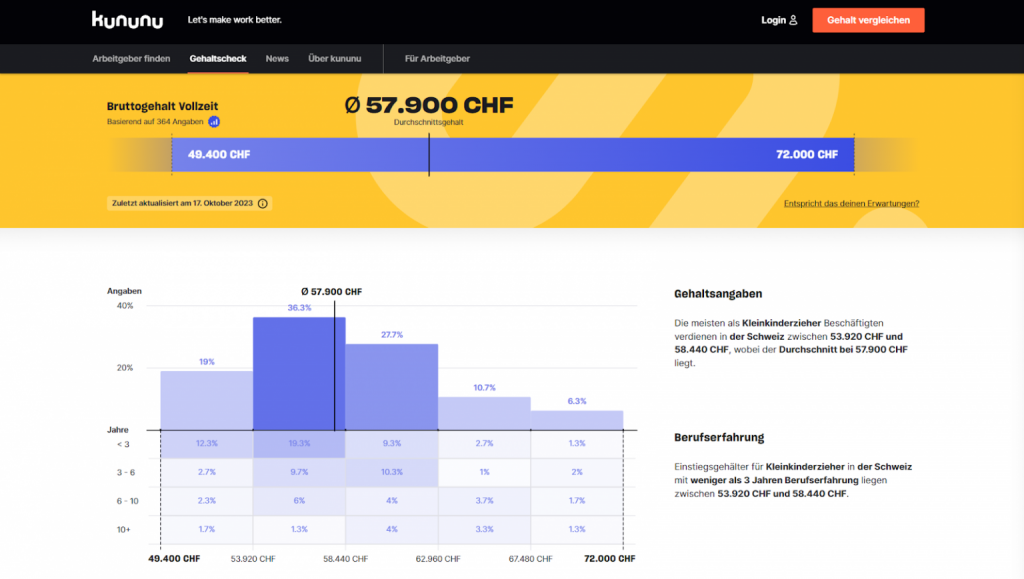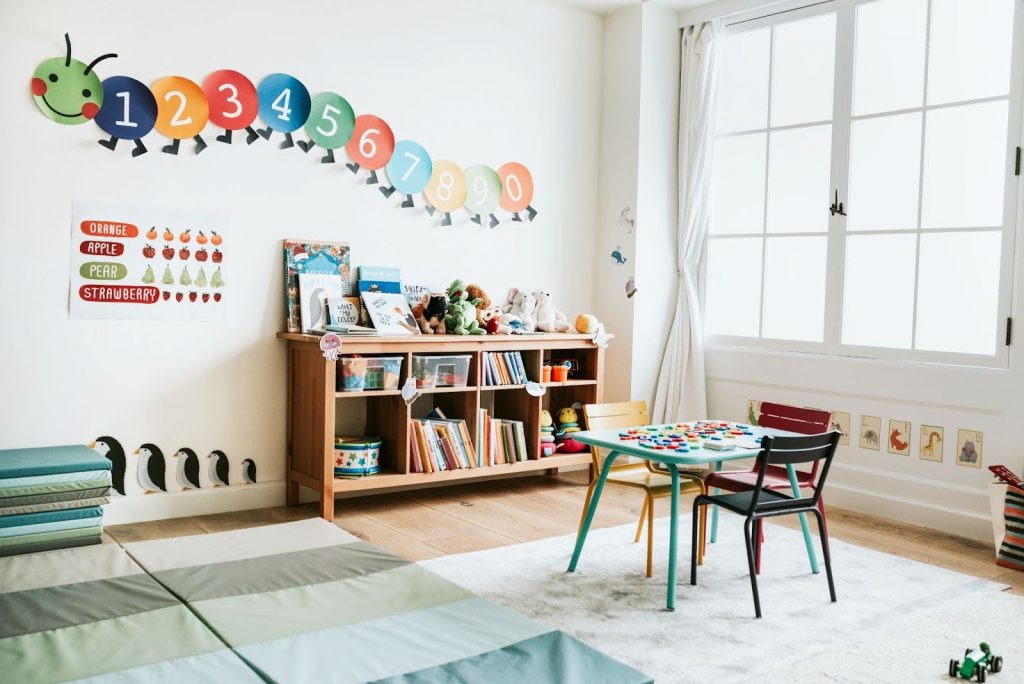Getting a new job without proper research and consideration is rarely a good idea. Job search platforms host plenty of daycare vacancies where every employer offers attractive working conditions. We conducted an in-depth study of the industry to know whether going after those enticing promises is actually worth it. While applying for a childcare position can be a great career choice, there are many nuances you need to know.
This article will explain what having a Kita job means and what the Swiss childcare job market looks like. You’ll learn about what you need to get a daycare vacancy, what salary range to expect, and how such a job can become the first stage of your career path in the adjacent fields. So, stay with us if you want to know whether a daycare job is right for you.
Childcare Industry: How Does It Work in 2024?
It is hard to overemphasize the importance of the childcare industry in Switzerland. The cultural shift of the Western world is noticeable in Swiss society as well—the traditional ‘male breadwinner’ model is slowly fading away, and the number of families with both partners working is increasing. Thus, working parents face a choice: delegate childcare to the grandparents or take their children to specialized institutions called Kitas.
What is a Kita?
Kita is a German word, shortened from KinderTagesstätte, roughly translated as children’s daycare center. In French-speaking regions, they are usually referred to as crèches. Kitas provide supervised care and education for kids between 3 months and 6 years old while parents are at work. Such centers can be both public and private, the latter being significantly more expensive for the parents.
So, if you decide to work with children, what professions can you choose from?

What Professions Are on the Market?
Usually, by ‘working in Kita’ people mean being a childcare specialist (Swiss often shorten it to FaBeKStands for Fachfrau/-mann Betreuung Kind). This is a very broad term, and a childcare specialist can perform a variety of tasks depending on the age of the kids and the specific needs of the Kita (for example, some Kitas emphasize outdoor trips and need people to monitor children’s activities in, let’s say, a forest).
However, lists of job offerings can include other positions, although you will see them way less frequently. Kitas may look for professionals with more narrow specializations, like:
🧑🏫 An early childhood educator is a specialist who designs and implements educational programs for children of different ages. It is not an entry-level position and requires a lot of training and job experience in the field, however, this is the most direct career development option after working as a childcare specialist.
🧑⚕️ Pediatric nurses’ jobs are indispensable for Kitas as they ensure children’s health and safety. This often includes reacting to medical emergencies, which is a huge responsibility. Usually, you need to complete special training and get a nursing degree to obtain such a position.
📢 Speech therapists are responsible for helping children with communication and language skills. This profession requires a solid medical background (a degree in speech-language pathology, to be specific). Speech therapists assess and diagnose speech and language disorders, design individualized therapy plans, and integrate language development into daily activities.
🔠 Language instructors are especially valuable in Switzerland because of the multilingual social environment (usually, schools require learning at least two Swiss languages). A children’s language instructor is not just a good teacher, but a person who can incorporate learning into interactive and engaging activities.
🌟 Special education teachers work with children with special learning needs or disabilities. They need to adapt the usual teaching strategies to address the individual requirements of every child. This profession requires a degree in special education and a deep understanding of children’s psychology and inclusive teaching practices.

Is There Enough Demand for New Specialists?
The short answer is yes. Sometimes, the most popular online job search platforms can add more than 40 job offerings in one day. In fact, many Kitas are understaffed and actively looking for new employees, offering childcare training for students and adults. There are several factors contributing to such a situation in the labor market. On the one hand, we have a very high demand, explained by factors like,
- Short maternity (14 weeks) and paternity (2 weeks) leaves
- High cost of living that pushes both parents to work
- Increasing recognition of the benefits of early childhood education
On the other hand—limited supply is caused by many economic reasons, that include:
- High costs of running a business (including high wages)
- Significant turnover rate
- Lack of trained employees
That is a peculiar labor market phenomenon, and there is a heated debate in the Swiss government on how to better manage this sector. But from a jobseeker’s perspective, all of this means that getting a daycare vacancy is not too difficult. But before you do, let’s explore the most crucial aspects of a childcare specialist’s job, including typical responsibilities and salary, to understand whether it is the right career path for you.

Is a Childcare Job Right for You?
When our team conducted an in-depth study of Swiss childcare, we wanted to answer several essential questions: what does a person need to apply for a Kita job, what are the typical work tasks and responsibilities, are the working conditions and pay acceptable, and how can a childcare specialist build their career?
To find the answers, we interviewed 11 managers and owners of Swiss Kitas, dozens of their employees, and kids’ parents. We are also constantly keeping an eye on every popular job-search platform and regularly reviewing hundreds of daycare vacancies. So, here’s what we’ve found.
Entry Barriers
Childcare is rightfully considered an industry with low entry barriers. With that being said, out of almost a thousand daycare vacancies we reviewed during the past several months, roughly 75% were childcare specialist or FaBeK positions. To obtain a specialist-level position, you need to have a Swiss Federal Vocational Certificate (EFZ) that would confirm your job training and experience in the field.
Therefore, if you have never worked in the industry, you should aim for the remaining 25% of daycare vacancies—15% are internships and 10% apprenticeships (we’ll explain the difference between them in the section about career potential). The good news is that it is still plenty of job offerings, as roughly 30 internship positions are posted weekly.
The absolute baseline for getting any Kita job, however, is a solid level of German (B2 at minimum) and a complete secondary education. In some cases, Kitas may ask you to complete a Check S2 or Multicheck test. You need to understand that soft skills are the ultimate key—communication, patience, responsibility, empathy, and creativity are the most frequent words you’ll see in job descriptions. And, no surprise here, you need to be passionate about working with children—otherwise, the work will just become too challenging. Now, let’s see how these qualities are manifested in a typical work process.

Responsibilities
Childcare specialists (even if they do the internship) have to be ready to perform a wide variety of tasks. We’ll mention the most universal ones, but the list can be easily expanded:
- Plan and organize daily activities, including playtime, arts and crafts, and the learning process.
- Proving kids with emotional and practical to help them learn and socialize.
- Observe and assess the behavior, progress, and developmental milestones of each child.
- Adapt your engagement style to fit the unique needs of every kid.
- Communicate with parents to keep them updated and involved in their child’s progress.
- Work in a team with other educators to ensure that no kid is left behind or feels abandoned.
While these responsibilities might not sound intimidating, the daycare jobs are actually physically and mentally demanding, so we’ll take a closer look at it in the section about the work environment.
Salaries
Questions about salary are always the most popular and the most tricky ones because salaries can be influenced by a variety of factors. Childcare specialist jobs are no exception. Your salary can be very different depending on your experience (for example, an intern receives significantly less than a 3-year apprentice pay), the canton you live in, the type of Kita (private ones pay more and have smaller turnover), and your workload. If we look at the averages, the data provided by Kununu seems to be the most reliable.

Kununu’s estimation of the childcare specialist’s salary of almost 58,000 francs (yearly) considers the smaller salaries of the interns, which represent one-third of the sample. Working a daycare job without training, you can expect your annual payout to be between 18,000 and 24,000 francs.
Growth Potential
The typical career path in the childcare industry starts with an application for a Kita internship that lasts 6-to-12 months. When it is completed, you get an apprenticeship offer and work as an apprentice for 3 more years. As an apprentice, you can change the Kita you’re working for and increase your salary every year of your practice. After that, you become a certified childcare specialist and can continue growing as a professional by undertaking more diverse responsibilities.
You can also choose one of the professions we mentioned when discussing the range of jobs with children. If you want to put your managerial talent to use—becoming a manager of a team of childcare specialists or even opening your own Kita can be another way forward.
Work Environment
The largest problem of almost every Kita in Switzerland is the high turnover rate. In large, this can be attributed to the demanding nature of the job. Performing a daycare job without proper training and support from experienced employees is extremely hard. Here are a few reasons why:
😤 Children’s behavior can be very challenging, and a childcare specialist needs to be patient and emotionally resilient. On the other hand, these challenges can be exciting if you love working with children.
💪 This job can also be physically demanding. You’ll need to stay alert for long hours to ensure kids’ safety. Sometimes, you might also need to lift and carry children.
🤯 A childcare specialist has to handle lots of communication. Children, colleagues, management, parents—you need to be respectful and attentive to everyone, which is not at all easy.
😓 Unfortunately, some Kitas try to take advantage of their interns. At least several childcare interns we talked to mentioned unfair pay, inadequate training and workload, and indifferent attitudes as reasons for giving up their jobs or changing the workplace. In turn, many managers said that they run short of staff, and currently looking for reinforcements.
On the upside, Kitas are usually small, family-owned businesses that foster close friendships among their employees. Having responsive colleagues is an essential advantage, as it allows mutual emotional support and ensures a compassionate work environment. These qualities are indispensable for people who got their Kita job without training and struggled with high levels of stress.

Summary
The high demand for childcare specialists and related professions persists in Switzerland, and you definitely have a solid chance of getting into the industry. With more than 30 new daycare vacancies posted every day, you have a wide choice of attractive Kita jobs. In this article, we covered the fundamentals you need to know before signing your contract.
The big advantage of the childcare industry is a low entry barrier. If you speak German and completed secondary education, you’ve already marked all the checkboxes for an internship application. Your job responsibilities will include planning and monitoring children’s activities and helping them learn and socialize. These tasks should not be taken lightly—working with children requires constant and undivided attention. Finally, experienced employees receive competitive salaries—if you have completed a 3-year apprenticeship and become a certified childcare specialist, your annual salary can go up to 70,000 francs, however, you’ll earn significantly less while you are an intern.
We hope our article answers the most important questions about the Kita jobs and will help you make the right career decision!
FAQ
🧐 How Can I Get a Job in Kita?
Getting an internship in childcare is rather easy, as the only requirements are a good knowledge of the German language (at least B2-level) and a completed secondary education. After completing your internship, you can become an apprentice, and later—a childcare specialist.
🥵 Is It Easy To Work in Childcare?
Working with children requires your undivided attention and lots of patience. It is a rather demanding job, both physically and mentally. Your workload will be limited while you are an intern, but you will still need to participate in children’s activities most of the time.
💸 How Much Does a Childcare Specialist Earn?
On average, the salary of a childcare specialist is roughly 58,000 francs annually, however, this number accounts for interns and apprentices who earn less and don’t necessarily have a 100% workload. If you are a certified specialist, you can earn up to 70,000 francs annually.
🫡 What Are the Responsibilities of a Childcare Specialist?
If you have a daycare job, the list of your responsibilities can be very diverse: from planning the children’s playtime to providing individual emotional support for a child and managing communication with parents.
